Don’t be alarmed if you hear your child’s teeth squeaking while they sleep. This is usually a sign of a common condition called paediatric teeth grinding or bruxism (also known as teeth grinding in children). At my dental practice, worried parents often ask me why their youngster clench their teeth and what they can do about it.
Their concern is understandable, as untreated bruxism can sometimes wear down teeth and lead to other health problems, but only if this behaviour is severe. Teeth grinding can also indicate an underlying sleep disorder or orthodontic problem. Normally, our first point of call is to rule this out, so we may refer patients to a specialist for further investigation.
This article combines research with my clinical observations to explain some of the causes of bruxism and how to stop teeth grinding in children.
What Is Tooth Grinding (Bruxism)?
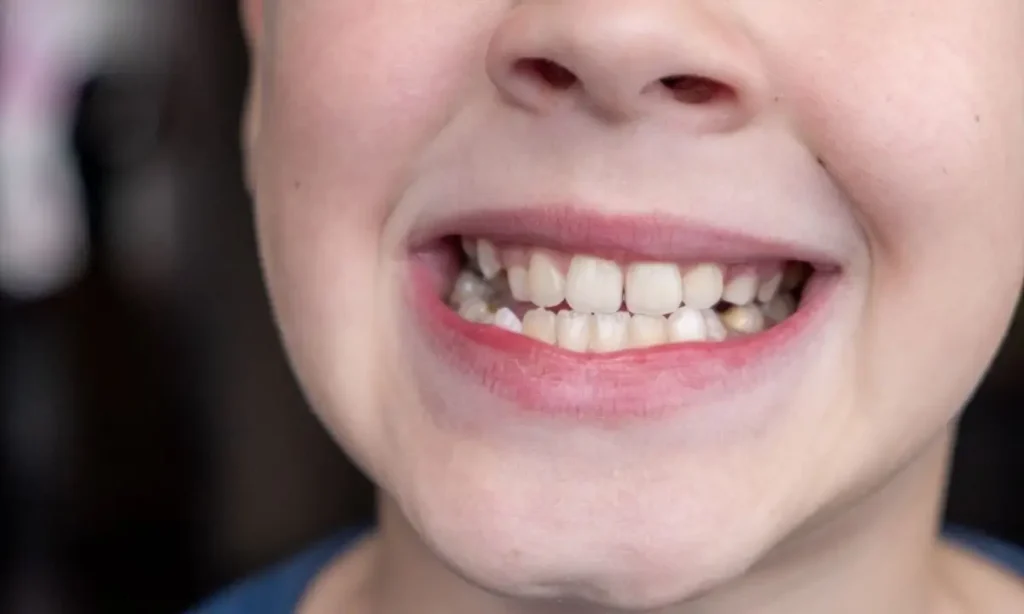
Bruxism occurs when people of all ages unconsciously grind or clench their teeth. Grinding or clenching—what’s the difference?
- Grinding (Rhythmic): The lower and upper teeth rub against each other. This involuntary motion forces the jaw muscles to move back and forth or from side to side.
- Clenching (Non-Rhythmic): Teeth are held together with pressure as the jaw muscles tighten, but there’s no movement of teeth against each other.
Both clenching and grinding place stress on the jaw muscles, but damage is usually more obvious with chronic grinding.
Bruxism Can Occur While Asleep or Awake
Nocturnal bruxism is the most common form of teeth grinding, and this occurs while sleeping. Awake bruxism tends to happen during the day, but far less frequently because our protective neuromuscular reflexes are stronger during waking hours. Problems can occur when these reflexes falter.
Our masticatory and restorative systems are well-equipped to handle the predominantly vertical forces that occur when chewing food or swallowing saliva. However, these systems don’t cope as well with the heavy horizontal force of bruxism, which places extra stress on our teeth, jaw, and facial muscles.
Sleep Bruxism in Kids
Around 8-10% of adults grind their teeth at night, but children are more likely to be impacted. Studies show that between 15-40% of children experience paediatric bruxism, mainly while sleeping. It’s believed the prevalence of this condition drops as people get older. Sleep bruxism can start as soon as teeth emerge, but most children outgrow it when they lose their baby teeth.
Health Complications of Paediatric Sleep Bruxism
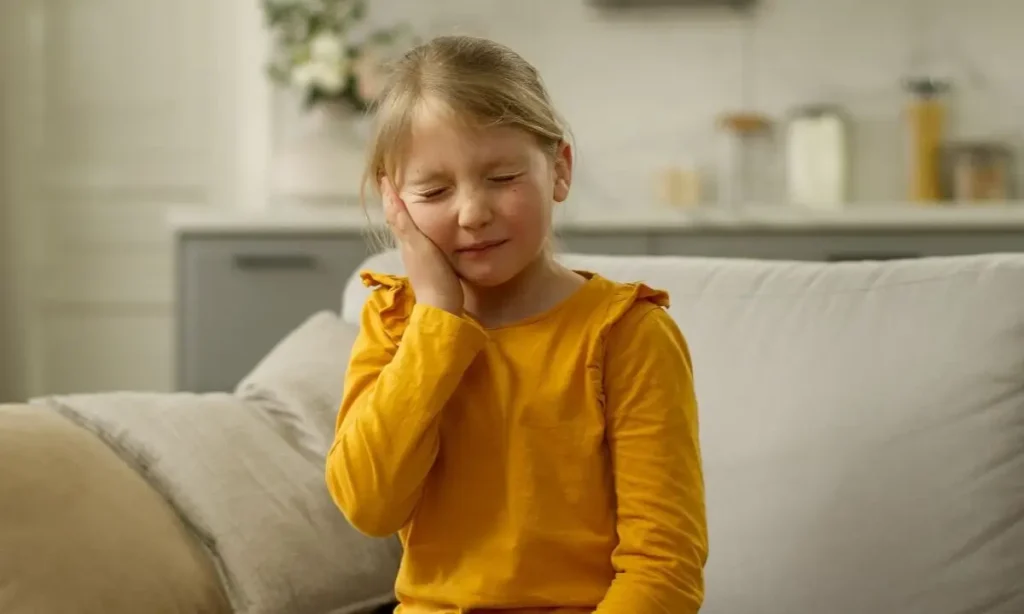
Teeth grinding in children doesn’t usually cause health problems, especially if baby teeth are involved. Unfortunately, the condition can persist and become severe. Chronic clenching or grinding of permanent teeth sometimes leads to health complications for children:
- Tooth sensitivity or pain
- Headaches or migraines
- Eroded enamel
- Receding gums
- Chipped or fractured teeth
- Tooth loss
- Teeth worn down to stumps
- Facial pain
- Ear pain
- Jaw pain
- Temporomandibular joint disorder (TMJ)
- Facial appearance changes (muscles appear larger)
Severe bruxism can also increase the risk of your child developing:
- Eating disorders
- Mental health problems
- Sleep problems
Signs of Teeth Grinding in Children
Nocturnal bruxism often goes undetected because it occurs during sleep. But there are some red flags, if you know what to look for.
A big sign is a scraping or screeching sound that occurs when enamel rubs against enamel. This is usually picked up by a sibling or parent whose sleep is disturbed by the unsettling noise. To help, you can place a baby monitor in your child’s room if you suspect they have bruxism (but don’t want to risk waking them to check for noises).
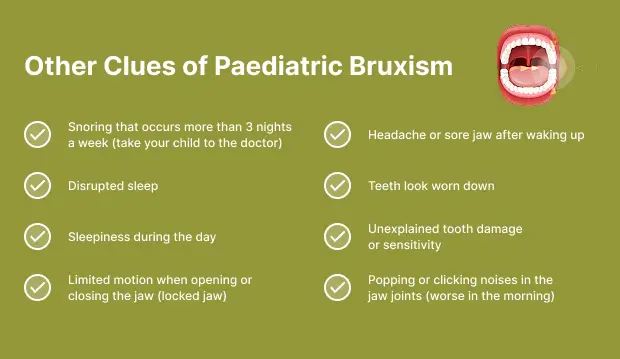
Please take your child to the dentist if you notice any signs of bruxism. Even if nothing seems amiss, regular check-ups allow dentists to check for symptoms that aren’t obvious to parents. Dentists who suspect bruxism will monitor their patient’s mouth over a few visits to see if there’s an ongoing problem. They will ask your child questions about sleep patterns, general health, and medications.
Note: Teeth grinding can be closely related to an undiagnosed medical condition, like a sleep disorder. Your child may be referred to a specialist for further evaluation.
What Causes Teeth Grinding in Children?
Bruxism is a complex condition that may be triggered by any number of factors, so it’s important not to ignore the signs. If your dentist suspects there’s a related medical problem, further investigation is required for diagnosis and treatment. A sleep disorder is one of the main health conditions that’s linked to tooth grinding. It’s also common for orthodontic problems to lead to bruxism.
Sleep Disorders
Paediatric nocturnal bruxism is often connected to sleep disorders such as obstructive sleep apnoea (OSA), which is a breathing problem that arises when throat muscles become too relaxed. More people than expected have both OSA and bruxism, according to multiple epidemiological studies.
It isn’t clear whether sleep apnoea causes bruxism or the other way around. There’s a possibility that both conditions are linked, but may arise independently. Whatever the connection, parasomnias (sleep disorders) are commonly comorbid with children who grind their teeth at night.
Examples of parasomnias include sleep paralysis, sleepwalking, and sleep-related eating disorders. Look out for symptoms such as restless legs, agitation, snoring, bed-wetting, nightmares, sleep-talking, dry mouth and excessive sweating. Dentists should ask children screening questions about their sleep routine, to explore this connection. A sleep study is usually required for further investigation.
Orthodontic Problems
Tooth grinding can be caused by any number of orthodontic problems (for example, when the upper and lower teeth are severely misaligned). Some patients have a high, narrow palate that reduces the amount of air that’s inhaled.
Early treatment may be required, which typically involves fitting an expander to the roof of the mouth (a process known as maxillary expansion). In many cases, the patient is referred to an ear, nose, and throat specialist (ENT), who may remove their adenoids or tonsils to increase airflow.
Various Risk Factors
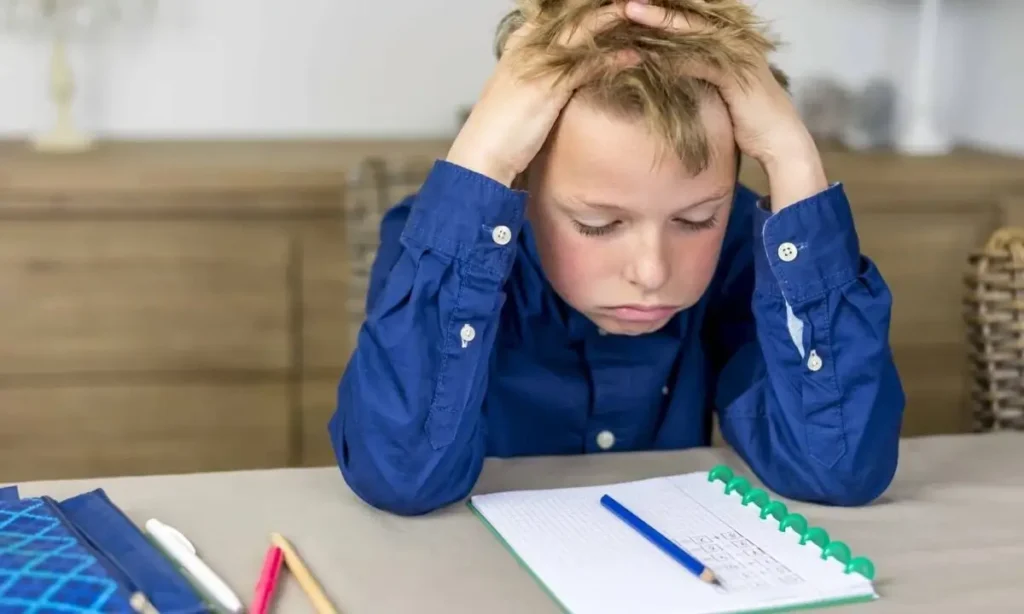
These factors could lead to bruxism in children and teens:
- Emotional stress
- Anxiety
- Depressed mood
- Attention-deficit/hyperactivity disorder
- Genetic conditions such as Rett syndrome, Pierre Robin sequence, and autism spectrum disorder
- Developmental factors like prematurity and mouth breathing
- Oral parafunctional habits: nail biting, chewing gum, biting on objects
- Obesity
- Certain medications
- Epilepsy and seizure disorders
- Traumatic brain injury
Other Factors That Can Cause or Exacerbate Bruxism
Stress and Anxiety:
Some research suggests that anxious children are more likely to grind their teeth, though further investigation is needed. One study shows that pre-schoolers with high levels of separation anxiety are prone to developing bruxism during their school years. Another study claims that toddlers in stressful situations are more susceptible to sleep bruxism.
These findings aren’t surprising, given that our bodies produce more adrenaline and cortisol when we’re stressed. This can lead to unconscious physical reactions, such as clenching or grinding teeth.
Genetics:
Your child is more likely to grind their teeth if someone in their family does too. Around 20-50% of bruxism patients are related to at least one person with a history of the same condition. There’s also some indication that boys are particularly prone to bruxism, though more research is needed.
Second-Hand Smoke:
Please keep your children away from passive cigarette smoke. Childhood bruxism may be triggered by exposure to second-hand smoke, even at moderate levels. Numerous studies link teeth grinding in children with moderate and high exposure.
How to Stop Teeth Grinding in Children?
Don’t wait to see if your child grows out of this. Instead, follow these steps:
- ALWAYS book an appointment with their dentist, who will examine the extent of the bruxism.
- Your child will then be referred to a specialist for diagnosis and treatment, if there’s any reason to suspect an underlying medical condition.
- In cases where there’s no obvious cause behind the bruxism, your dentist will suggest a treatment plan that helps to alleviate the tooth grinding.
Every treatment plan is based on the individual’s needs but may combine orthodontic treatment with holistic strategies and support from specialists (when required to treat underlying conditions).
Meditation
Regular meditation is a powerful way to lower stress, which can indirectly alleviate bruxism. Young children may benefit from a general mindfulness exercise for kids, such as the one below:
Note: You can find free mindfulness resources for children of all ages here. Teenagers might have more patience to try a specific meditation for jaw tension, such as this video or this one.
Emotional Therapy
Please consider taking your child to see a counsellor or psychologist, if they show signs of anxiety, stress, or depression. Ask their GP for a mental health plan, or encourage your teen to make this request. Your child may be eligible for psychological support that’s subsidised by the government.
Bedtime Routine
Set up a bedtime routine that gives your child the best chance of getting quality sleep, ideally at the same time every night. This isn’t the time for electronic devices, and their room should be dark and quiet.
A nourishing snack with high amounts of melatonin can help to regulate sleep-wake cycles. Examples of such foods include nuts, grapes, oats, milk, and tart cherries. A warm bath is a good way to soothe the mind and body before sleep. Many children also enjoy having stories read to them or listening to soft music.
Healthy Eating and Exercise
A balanced diet stabilises blood sugar levels, which helps children to feel grounded. It’s important to include whole foods such as fruits, vegetables, nuts, legumes, and fermented products that are rich in probiotics. Foods with added sugar should be an occasional treat.
Exercise is a fun way to reduce stress by releasing feel-good endorphins. Running, swimming, martial arts, team sports, skipping, and dancing are popular activities for children. Don’t push your child beyond their limit, though. Ask your GP about suitable activities if you have any concerns.
Targeted Exercises for Tongue and Jaw Muscles
Dentists can teach children age-appropriate exercises for relaxing the muscles in their mouths.
Orthodontic Treatment
Some cases of paediatric bruxism occur when children have misaligned teeth or jaw problems. The underlying condition can usually be resolved with orthodontic treatment such as braces.
Mouthguards
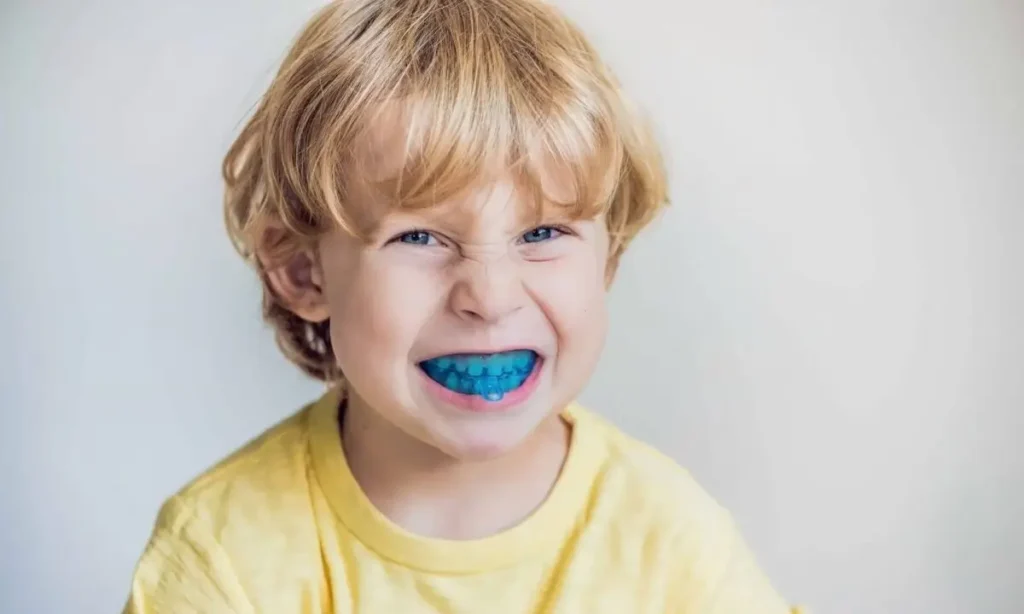
A mouthguard may be required to protect permanent teeth in children. Mouthguards provide a cushioning barrier that stops enamel from rubbing together. This is a non-invasive way to alleviate bruxism, but dentists should monitor the situation to ensure that teeth can develop normally under the mouthguard.
Prevention and Treatment for Sleep Bruxism in Children
Sometimes, severe bruxism isn’t diagnosed and treated in time, leading to structural damage that needs to be mended with dental treatments, such as fillings or dental crowns.
Restoring damaged teeth can be expensive and uncomfortable, although cosmetic treatment isn’t commonly required. Prevention is always the best solution. Please book regular dental check-ups for your child, so their tooth grinding doesn’t go unnoticed. If you’re worried about the cost, eligible people (aged 17 or under) can receive up to $1,132 from the federal government to cover two years of basic dental services.
The friendly Mona Vale Dental team has been helping children stop grinding their teeth for more than a decade. We’re also experienced in treating any dental complications that arise from bruxism. Call us on (02) 9997 1100 to book an appointment or find out more.

